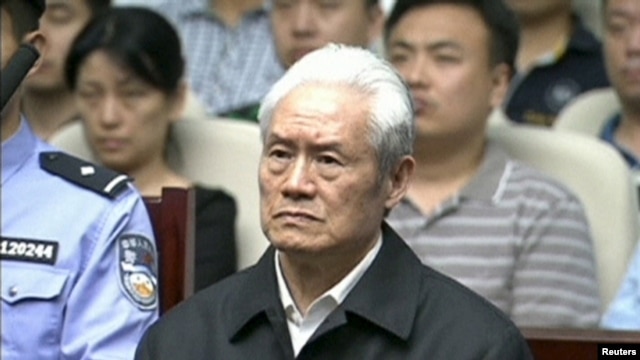
Zhou Yongkang, China's former domestic security chief, attends his sentence hearing in a court in Tianjin, China, in this still image taken from video provided by China Central Television and shot on June 11, 2015.
BEIJING—
China's secret trial and sentencing of former security chief Zhou Yongkang to life in prison marks the beginning of a new phase in the country's anti-corruption drive. But where Chinese leader Xi Jinping will take the campaign next is unclear. Some analysts say there are already signs that the administration may dramatically ratchet down the anti-graft campaign.
Zhou Yongkang was once one of China’s most powerful politicians. He was a former public security chief and ex-head of the party’s legal and political commission, a man who as one analyst puts it “had all the files and knew where the bodies are buried.”
Before he stepped down, he was a member of the party’s top decision-making body, the politburo standing committee.
“This was why the experts for a long time doubted that he could be taken down,” said David Kelly, is research director at the Beijing-based group China Policy.
“How do you take down the former head of the, so to speak, KGB or the CIA? This is the guy who knows everything.”
Who is next?
But now that Xi Jinping has done just that, where does he go next? Does he go after even bigger tigers, such as former heads of state? Or does the campaign grind to a halt.
Author and academic Kerry Brown says the campaign is likely to continue, pursuing other disgraced officials such as Ling Jihua, a political adviser to former Chinese leader Hu Jintao.
But Brown, who heads the China Studies Center at the University of Sydney, says it is unlikely Xi will go after even higher ranking officials such as Jiang Zemin or Hu Jintao — as has been widely rumored in China.
Brown says that with Zhou Yongkang, there were very clear reasons why he needed to be removed.
“I don’t think that we will see an intensification, but I do think we will see a continuation and a very gradual lowering of the pressure as it were because I think this has made the kind of hits the party has needed under Xi and I can’t see that intensifying it will continue to give them the kind of political returns that would justify [doing that],” he said.
Claws in
In China, there are already signs of the anti-corruption campaign shifting gears. Just a day before the sentence of Zhou was announced last week, the Communist Party-backed People’s Daily ran a story that talked about how the party’s top inspection body was already considering how it might change its tact.
According to the newspaper, the party’s Central Commission for Discipline Inspection recently published on its website reports that not only highlighted the risk that party inspectors could overstep their powers, but the need to shift their focus away from high-ranking officials. Instead, the commission called for supervising and disciplining lower ranking cadres, and perhaps imposing more lenient punishments.
Zhou was the highest-ranking communist party official to ever face charges. But his secret trial and the sudden announcement of his sentence last week — made almost a month after the proceedings were over — has sent mixed signals to the public.
China Policy’s David Kelly says the trial and the outcome looks to many people like a folding up of the anti-corruption campaign.
“The heat is off. The political drama that was escalating of resistance to any more of the higher level purges," he said. "The political side of the campaign is ebbing, but on the other hand some more public moves will be made.”
Keeping them guessing
But Zhang Ming, a political scientist at Beijing’s Renmin University says the fact that the entire trial was kept secret and that Zhou was not given a harsh or light sentence has also added more uncertainty.
Zhang says “at the very least, the corruption charges in the trial could have been opened to the public, but they were not. The reason for that, he says, “is that there must have been too many secrets connected to the charges that they did not want to make public.”
Without any details and any information from the trial it is difficult for observers and officials to really say with any certainty what is on the horizon, he adds. That makes it difficult to predict whether the campaign is wrapping or for officials to even know whether they are safe or not. |
|
